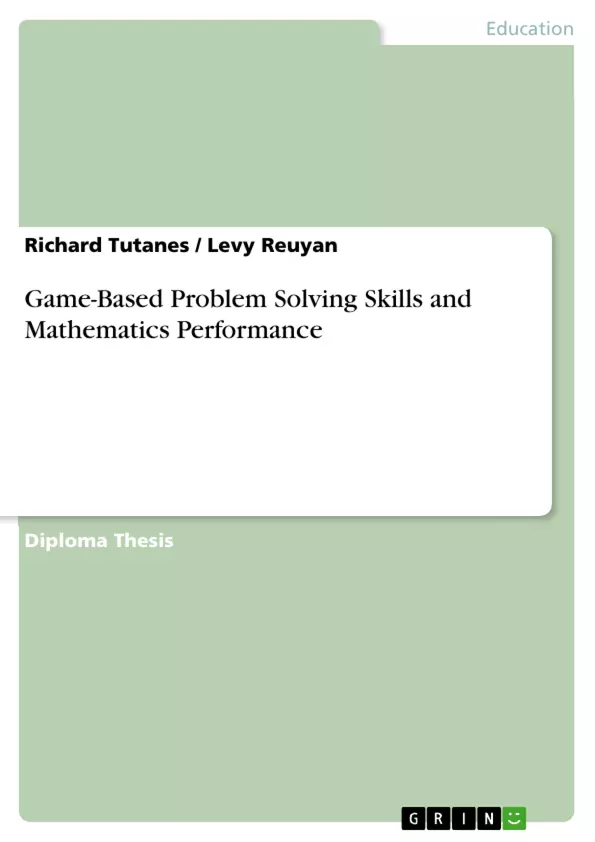This study aimed at assessing game-based instruction in improving mathematics performance in problem-solving and the development of problem-solving skills. Results show that in the two groups, the level of students’ learning using the game-based problem-solving in teaching appeared to have a fair performance compared to that of the conventional method. This implied that using the game-based problem-solving in teaching mathematics is more effective than employing the conventional method. Thus, the use of game-based problem-solving in teaching mathematics can improve the performance of the students in Mathematics.
Inhaltsverzeichnis (Table of Contents)
- THESIS ABSTRACT
- The Problem
- Introduction
- Perspective of the Researcher
- Conceptual Framework
- Statement of the Problem
- Hypotheses
- Significance of the Study
- Scope and Limitations
- Definition of Terms
- Review of Related Literature
- Game-Based Approach
- Sophisticated Manipulatives
- Problem Solving Skills
- Role of Problem Solving in Mathematics Education
- Methodology
- Research Design
- Research Environment
- Research Subject
- Sampling Techniques
- Research Instruments
- Data Gathering Procedure
- Statistical Treatment
- Presentation, Analysis and Interpretation of Data
- Summary of Findings, Conclusions and Recommendations
- Conclusions
- Recommendations
- Bibliography
Zielsetzung und Themenschwerpunkte (Objectives and Key Themes)
This thesis aims to investigate the impact of using manipulative materials in teaching mathematics on the learning outcomes of Grade 7 students. The study seeks to determine if the use of manipulatives leads to significant improvements in students' problem-solving skills and overall mathematics performance. This study specifically focuses on the effectiveness of manipulative materials compared to conventional teaching methods.
- The effectiveness of manipulative materials in enhancing mathematical learning outcomes.
- The relationship between the use of manipulative materials and students' problem-solving skills.
- The impact of different teaching methods (manipulative-based vs. conventional) on student performance.
- The development of an action plan to improve learning skills using manipulative materials.
Zusammenfassung der Kapitel (Chapter Summaries)
The thesis begins by introducing the research problem and its significance. It delves into the background and rationale for the study, highlighting the researcher's perspective on the importance of manipulative materials in mathematics education. The study's conceptual framework is presented, outlining the key theoretical underpinnings of the research. The statement of the problem, hypotheses, significance of the study, scope and limitations, and definition of terms are also outlined in detail.
The chapter on Review of Related Literature provides a comprehensive overview of existing research on game-based approaches, sophisticated manipulatives, problem-solving skills, and the role of problem solving in mathematics education. This chapter serves as a foundation for understanding the theoretical and empirical context of the study.
The Methodology chapter outlines the research design, environment, subjects, sampling techniques, instruments, data gathering procedures, and statistical treatment used in the study. The study employs an experimental design with two groups: an experimental group receiving manipulative-based instruction and a control group receiving conventional instruction. Both groups were assessed using pretests and posttests.
The thesis then proceeds to present, analyze, and interpret the collected data. The findings of the study are presented and discussed in detail, followed by the conclusions drawn from the analysis. Finally, recommendations are provided based on the research findings, suggesting practical implications for improving mathematics instruction using manipulative materials.
Schlüsselwörter (Keywords)
This thesis explores the key concepts of manipulative materials, game-based learning, problem-solving skills, mathematics performance, experimental research, and educational interventions. The study investigates the effectiveness of manipulative materials in enhancing students' mathematical learning outcomes, particularly in the domain of problem-solving. The research findings provide insights into the potential benefits of integrating manipulative materials into mathematics instruction and contribute to the ongoing dialogue surrounding effective teaching practices in mathematics education.
Frequently Asked Questions
What is game-based instruction in mathematics?
It is a teaching method that uses games and interactive activities to help students understand mathematical concepts and improve their problem-solving skills.
Is game-based learning more effective than conventional methods?
According to this study, students using game-based problem-solving showed better performance and development compared to those taught with traditional methods.
What are mathematical manipulatives?
Manipulatives are physical or digital objects (like blocks, tiles, or software tools) that students can move and handle to explore mathematical ideas visually and tangibly.
How does gaming improve problem-solving skills?
Games often require strategic thinking, trial and error, and logical reasoning, which are essential components of solving complex mathematical problems.
What grade level was focused on in this study?
The study specifically investigated the impact of these methods on Grade 7 students.
What is the significance of using manipulatives in education?
Manipulatives help bridge the gap between abstract symbols and concrete understanding, making mathematics more accessible to diverse learners.
- Quote paper
- Professor Richard Tutanes (Author), Levy Reuyan (Author), 2016, Game-Based Problem Solving Skills and Mathematics Performance, Munich, GRIN Verlag, https://www.grin.com/document/381300



